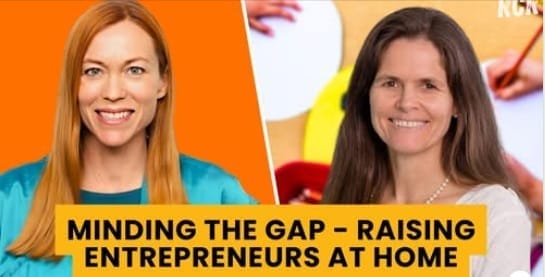Shirley Erwee
Shirley Erwee
Mind the Gap: The Educational Void that Parents Must Fill
Imagine a game of Jenga.
Each wooden block represents a key piece of a child’s development—math, reading, history, science. But as the tower grows, there are critical pieces missing: financial literacy, creative thinking, emotional resilience, real-world problem-solving. At first, the tower stands. But over time, those gaps create instability. Eventually, it all topples—not from a lack of education, but from the wrong kind of education.
This is what many children face today.
They spend over a decade stacking academic blocks in a school system designed for the past. But the foundational pieces they need to thrive in today’s innovation economy—entrepreneurial thinking, adaptability, personal finance and self-leadership—are missing.
The result?
A generation of students prepared to follow instructions, not lead. They are trained to look for jobs, not create value, conditioned to seek permission instead of to pursue opportunity.
Parents, this is the gap and you are the ones best equipped to fill it.
“Go to school. Get good grades. Get a job.”
It’s the advice generations of parents have given their children, trusting that the traditional education system will prepare them for a successful future but in today’s rapidly changing world, this well-meaning script is no longer enough. In fact, it’s leaving a gaping void—a gap that parents must urgently fill.
The Industrial Legacy of the School System
The modern education system was designed during the industrial era. It was built to produce workers, people who could follow instructions, complete tasks and fit into existing structures. That’s why it emphasises conformity, memorisation, standardised testing and siloed subjects. It was perfect for producing employees.
But the world has shifted. Today’s economy rewards problem-solvers, creators, leaders, and visionaries. It demands emotional intelligence, digital fluency, financial savvy and entrepreneurial initiative. These are not the skills prioritised in most classrooms.
The ‘Get a Job’ Mindset vs. the ‘Business of You’
School teaches children how to work in someone else's business. It doesn’t teach them how to think like a business.
And yet, whether your child becomes a neurosurgeon, a freelancer, a software developer or opens a bakery—they are in the business of themselves. Their time, their talents, their knowledge, their reputation, their network and even their well-being are all assets to be managed wisely.
Unfortunately, most students graduate with no concept of this. They leave school knowing how to take a test but not how to negotiate a salary. They can recite the periodic table but not balance a budget. They know how to follow a curriculum but not how to create opportunities.
The Real Gap:
A Lack of Entrepreneurial Literacy
Let’s be clear: this is not about turning every child into a business owner. It’s about equipping them with an entrepreneurial mindset—the ability to think independently, solve real-world problems, take initiative, manage risk and adapt to change.
These skills serve future employees and employers alike. A proactive employee who understands value creation, innovation and personal branding will always outperform someone who simply "does their job."
Yet the current system doesn’t teach:
How to turn ideas into income
How to recognise and act on opportunity
How to manage time as a finite, valuable resource
How to make money and then put money to work
How to build multiple streams of income
How to use failure as fuel, not shame
This is the gap. And this is where parents come in.

Parents: You Are the Missing Curriculum
If schools won’t teach it, we must. Parents are in a unique position to supplement education with what actually matters for long-term financial, emotional, and professional resilience.
You can begin by:
Normalising entrepreneurship. Talk about business ideas at the dinner table. Let your children see you solve problems creatively.
Teaching financial literacy early. Help your child understand money as a tool, not just a reward for work.
Encouraging experiments and side hustles. Let them sell home-baked treats, flip items online, or create content.
Modelling lifelong learning. Show your kids that growth doesn’t stop with school—it evolves with curiosity and courage.
Rewarding initiative and effort, not just achievement. Praise problem-solving, persistence, and learning from mistakes.
Reframing Success for the Next Generation
Our children are not just future employees or employers—they are future value creators. Whether they choose a corporate path, the gig economy, or launch a startup, the same mindset applies: they are in the business of being themselves—and they must learn to manage that business well.
The question isn’t whether your child will work for someone else or for themselves. It’s whether they will be equipped to thrive, to recognise their unique value, to think critically and creatively and to build a life that is both financially and personally fulfilling.
That kind of success isn’t taught in school but it can start at home.
Mind the gap. Not just the one between school and work but the one between what your child is learning and what they’ll actually need to succeed.
And then, fill it.
Natalie Cutler-Walsh of Real Conversations Radio (RCR) recently interviewed me on this very topic. In our discussion, we explored how parents can bridge the gap between what schools teach and what kids really need to thrive in today’s world.
Click on the image to view the recording.
Stay fired up for success with Shirley's
Entrepreneur Newsletter
Raising Job Creators
Keep up the momentum of building your family's financial education.
Don't lose your drive to take small daily steps to reach for big dreams.
Your privacy is secure.
You can opt-out anytime.
Categories
Raising Job Creators Newsletter
Subscribe to the newsletter and stay fired up for success! By joining, you acknowledge that you'll receive Shirley's newsletter. You can opt-out anytime hassle-free.
Copyright © 2025. Shirley Erwee. All Rights Reserved
Created with ©systeme.io




